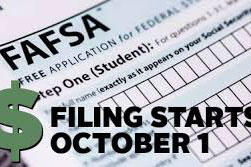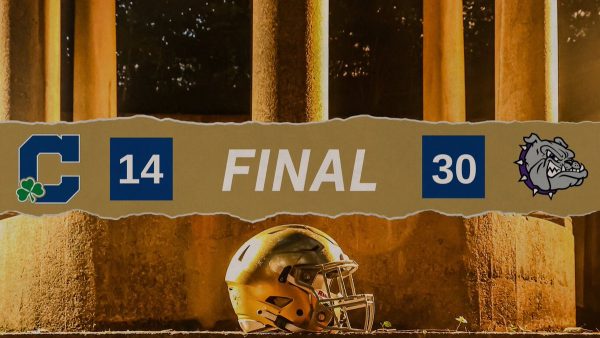Online financial aid portal open as of Oct. 1
Counselor encourages early completion of FAFSA form

Oct. 1 marks the first day that seniors and their families can begin filling out their FAFSA form.
The FAFSA stands for free application for federal student aid.
School and college counselor Ms. Kathy Pivonka said, “We encourage all families to fill out the FAFSA, regardless of the situation.”
The FAFSA is a universally accepted file for colleges across the country. Pivonka said, “It’s the form that you’re going to use for any school; it’s a federal process. Every school will use that federal calculation and information to determine your need based aid.”
While some families are hesitant to fill out the form, Pivonka said it’s important to complete it. Pivonka added, “Some parents who’ve had students previously (in college), might know what they qualify or don’t qualify for, but you don’t know until you apply.”
Due to advances in technology, filling out the FAFSA is a far less strenuous process. Pivonka said, “It’s free. It’s a lot simpler than it used to be, back when you did paper and pencil. Fluctuating incomes due to the Covid-19 pandemic can cause stress for families. But Pivonka said, “If you get (the FAFSA) filed and something happens to your income after school starts, they can revisit it as long as you’ve met the deadline. And if finances change with the family and it’s already filed, (the FAFSA) is always that safety net.”
Additionally, the FAFSA has a relatively new IRS retrieval tool. Pivonka said, “So when you go in to start filling out your FAFSA, you put in your information and it will go and grab the information from your taxes and plug it in.”
There are also various preparatory steps underclassmen can take. “Students that haven’t filled it out, like juniors, every school is required to have a net price calculator on their website. Students can do an early (estimation) of what they might qualify for at a school. There are a lot of things you can do on the front end to kind of know what it might look like when you fill out the FAFSA,” Pivonka said.
Pivonka added that filling out the FAFSA as soon as possible will come with benefits. “The earlier you complete it, the more opportunities you have. You find out earlier. A student who fills out their FAFSA earlier could see their package as early as late December to early January, whereas some others may see it in March,” said Pivonka.
Although families have between now and June to fill out the FAFSA, Pivonka said, “You don’t want to wait that long.” Deadlines also vary between schools. Typically private schools will require an earlier deadline than will public universities.
The process for filling out the FAFSA includes gathering 2020 financial data. “Students have to apply for a PIN number, which is your electronic signature, and one parent also needs to apply for a PIN. We want students to have involvement in (the college application process), but we know that this might be that one piece that the parents have to take a lead on, because some parents may not want you to know all of their business in terms of their income and their assets,” Pivonka said.
The next step invoked creating an account on www.fafsa.ed.gov. Pivonka added, “It’s always important to note that it is the student’s account.” Parents will also have to go through this account if they want to take out PLUS loans.
Once the FAFSA has been submitted, the student will receive their financial aid package. Pivonka said, “It will show any merit based, athletic money, scholarship or anything outside of the need based realm, as well as the need based financial aid. For the need based financial aid, there will be grants, college work study and the loan program.”
The package will also include a number called the expected family contribution (EFC).
Pivonka said, “It could be anywhere from zero to several tens of thousands of dollars depending on your family’s financial number. The lower the number, the more aid you will probably receive. They take the cost of attendance minus the EFC number.”
Although Pivonka encourages all families to apply for the FAFSA, she said, “You have the opportunity when you attend a school to accept or decline any aid. You could decline loans if you don’t want to take out loans, you could decline the work study if you don’t want a job on campus, even if you qualified for that.” Pivonka added that she understands that all choices involving the FAFSA are what she termed “family decisions.”
The counseling department advises all families, specifically those who are new to the college application process, to ask questions at the college financial aid offices. Pivonka said students and their families can always come to the counselors to ask questions as well. Pivonka said, “(Counselors) never claim to be FAFSA gurus, but we can always get people to the right places.”

Ashlynn Bakemeyer is a senior and the co-editor-in-chief of the Megaphone. At Cathedral she is involved in the Best Buddies Club. Outside of school she...






